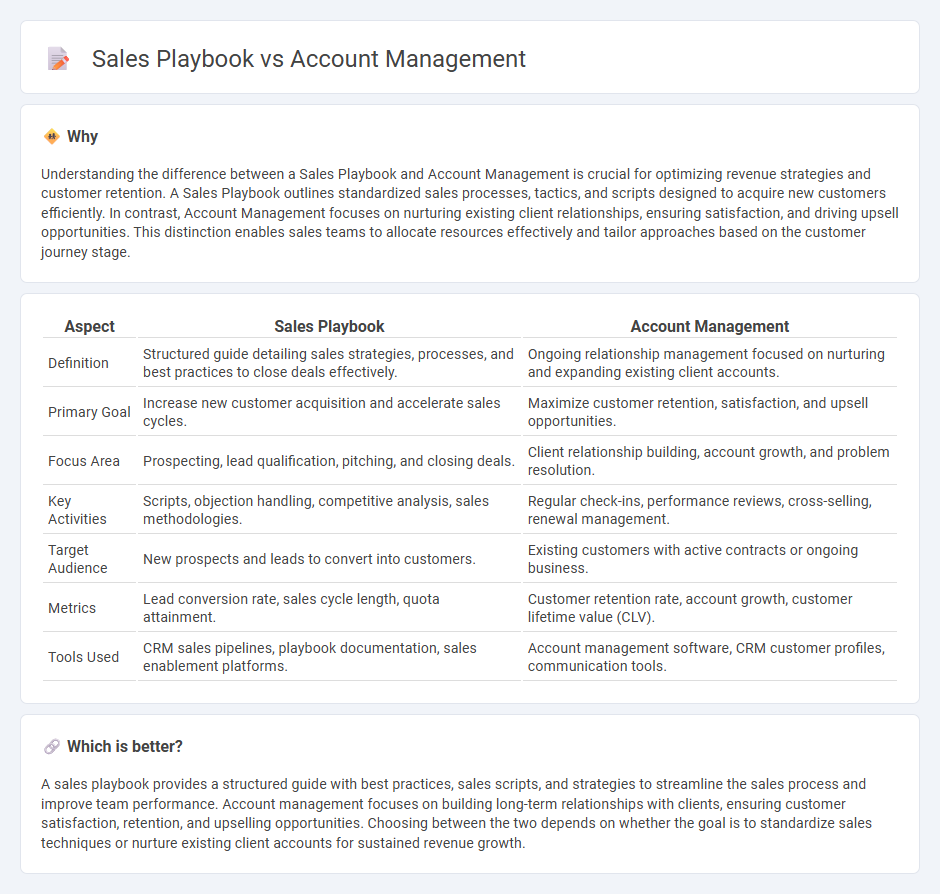
A Sales Playbook outlines standardized strategies, best practices, and scripts designed to streamline the sales process and enhance team performance across various accounts. Account Management focuses on nurturing client relationships, ensuring customer satisfaction, and driving long-term growth through tailored support and strategic upselling. Discover more about optimizing your sales strategy by understanding the distinct roles of Sales Playbooks and Account Management.
Why it is important
Understanding the difference between a Sales Playbook and Account Management is crucial for optimizing revenue strategies and customer retention. A Sales Playbook outlines standardized sales processes, tactics, and scripts designed to acquire new customers efficiently. In contrast, Account Management focuses on nurturing existing client relationships, ensuring satisfaction, and driving upsell opportunities. This distinction enables sales teams to allocate resources effectively and tailor approaches based on the customer journey stage.
Comparison Table
| Aspect | Sales Playbook | Account Management |
|---|---|---|
| Definition | Structured guide detailing sales strategies, processes, and best practices to close deals effectively. | Ongoing relationship management focused on nurturing and expanding existing client accounts. |
| Primary Goal | Increase new customer acquisition and accelerate sales cycles. | Maximize customer retention, satisfaction, and upsell opportunities. |
| Focus Area | Prospecting, lead qualification, pitching, and closing deals. | Client relationship building, account growth, and problem resolution. |
| Key Activities | Scripts, objection handling, competitive analysis, sales methodologies. | Regular check-ins, performance reviews, cross-selling, renewal management. |
| Target Audience | New prospects and leads to convert into customers. | Existing customers with active contracts or ongoing business. |
| Metrics | Lead conversion rate, sales cycle length, quota attainment. | Customer retention rate, account growth, customer lifetime value (CLV). |
| Tools Used | CRM sales pipelines, playbook documentation, sales enablement platforms. | Account management software, CRM customer profiles, communication tools. |
Which is better?
A sales playbook provides a structured guide with best practices, sales scripts, and strategies to streamline the sales process and improve team performance. Account management focuses on building long-term relationships with clients, ensuring customer satisfaction, retention, and upselling opportunities. Choosing between the two depends on whether the goal is to standardize sales techniques or nurture existing client accounts for sustained revenue growth.
Connection
A sales playbook provides structured strategies and best practices that guide account management teams in nurturing and expanding client relationships. It offers standardized processes for identifying customer needs, handling objections, and closing deals effectively, which directly enhances account retention and growth. Integrating the sales playbook ensures consistent communication and performance metrics across all managed accounts, driving revenue predictability and customer satisfaction.
Key Terms
Account management:
Account management centers on nurturing long-term client relationships, ensuring high customer retention rates and maximizing lifetime value through personalized service and strategic upselling. Key metrics include customer satisfaction scores (CSAT), net promoter score (NPS), and renewal rates, highlighting the importance of proactive communication and problem resolution. Explore effective account management strategies and tools to enhance client loyalty and revenue growth.
Client retention
Account management emphasizes client retention by nurturing long-term relationships, ensuring customer satisfaction, and addressing evolving needs to prevent churn. In contrast, sales playbooks prioritize lead conversion and revenue generation through targeted outreach, product positioning, and negotiation strategies. Explore comprehensive strategies to optimize client retention through effective account management.
Relationship building
Account management emphasizes long-term relationship building through personalized client engagement, tailored solutions, and consistent value delivery. Sales playbooks prioritize structured prospecting, lead qualification, and closing techniques aimed at generating immediate revenue. Discover key strategies to balance both approaches effectively for sustained business growth.
Source and External Links
What Is Account Management? (With Duties and Skills) | Indeed.com - Account management involves daily management of client accounts to nurture relationships, identify customer needs, maximize business opportunities, and ensure client satisfaction through tasks like communication, contract management, issue resolution, and collaboration with sales and marketing teams.
What is Account Management? - Clay - Account management is a strategic, post-sales process focused on nurturing client relationships, ensuring customer satisfaction and retention by understanding needs, advocating for clients within the company, and identifying opportunities that foster loyalty and revenue growth.
Account manager - Wikipedia - An account manager oversees sales and relationships with clients, managing multiple or single accounts depending on company size, with responsibilities including generating sales, resolving client conflicts, collaborating internally, and sometimes managing accounts on a national or global scale.
 dowidth.com
dowidth.com